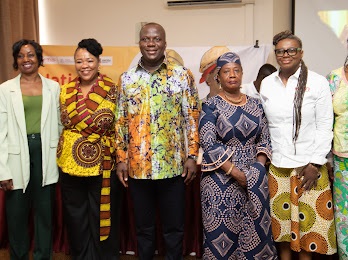
Lands Ministry to partner Women in Mining to ensure gender inclusivity in industry
The Ministry of Lands and Natural Resources is to partner with Women in Mining Ghana (WIM) to ensure inclusivity in the mining sector.
For that reason, opportunities would be created for women to participate in all aspects of the industry, especially within the ranks of administration, from entry-level positions to leadership roles, supporting women in training and education in fields such as geology and chemical engineering.
The intervention has become necessary because available figures show that the mining sector has remained a male-dominated industry and continue to face gender and social inclusion challenges.
Women participation in the sector remains worryingly low.
According to estimates from the Mineral Commission of Ghana, only 9 per cent of women professionals out of a total workforce of 31, 609 are employed in large scale mining corporations.
The Minister of Lands and Natural Resources, Samuel Jinapor stated these at a National Policy Dialogue organised by WIM Ghana in Accra recently. It was on the theme “Diversity, Inclusion, and Belonging: Actions for the Mining Sector”.
Participants were drawn from government institutions, mining companies, metropolitan and district assembles, the media and Civil Society Organisations. In attendance were traditional authorities including Chiefs and queen mothers.
Unwavering commitment
Mr Jinapor, expressed government's unwavering commitment to partnering with Women in Mining Ghana and stakeholders across the industry to drive meaningful changes for a more inclusive and prosperous mining sector which is fit for purpose.
Highlighting Ghana's rich mining history and its pivotal role in the national economy, Mr Jinapor emphasised the government's vision to position Ghana as the primary hub of Africa's mining activities.
He stressed the significance of inclusivity and justice in broadening participation in the industry, applauding Women in Mining Ghana for its advocacy efforts and commitment to core industry values.
On economic empowerment, the minister pointed out that the contributions of women to the mining sector,was substantial citing examples of local content initiatives such as catering services, which generates significant revenue, as much as $ 2million dollars.
"So I charge the Women in Mining to pay particular attention to training because part of inclusion is training and educating the women to become part of the process from the very beginning.
Taking relevant programmes that will make them qualified from the word go so that there is no reason not to include them" he emphasised.
Left out
The Chairman for the occasion and a Board member of the Minerals Commission, Mrs. Judy Nakuor Crayem, said although women constituted 50 per cent of labour in the mining sector, they were left out in critical decision making in the industry.
She affirmed that challenges faced by women could be dealt with by providing a level playing field without discrimination for all women in the sector.
Mrs. Crayem announced that, WIM in partnership with Ghana National Association of Small-Scale Mining (GNASSM) were offering women other avenues for training in jewellery making and lapidary as an alternative livelihood and also as a way to address the lagging issues in the mining industry.
The President of Women in Mining, Ghana, Georgette Barnes Sakyi-Addo, explained that subsequent to significant researches made, aimed at shining light on the realities faced by women in the mining sector, challenges such as access to information, financial resources, and inadequate policies to support active involvement have been identified.
The President further said the policy dialogue was not just to acknowledge the challenges, but to focus on actionable solutions.
She called on all stakeholders and participants to take the agenda of diversity, inclusion and belonging forward, not just within borders but to the broader African Union and ECOWAS."Let us make this a collective effort, a united stand for a more inclusive and prosperous mining sector."
There were also Solidarity messages given by other Presidents of Women in Mining Africa from Congo, Niger, Nigeria and Namibia.
